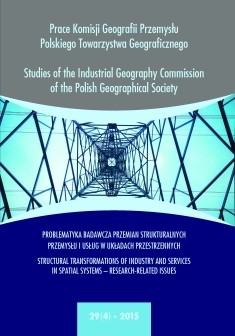Subcontracting as entrepreneurial opportunity. Conceptualization and research model proposition
DOI:
https://doi.org/10.24917/20801653.294.4Keywords:
entrepreneurship, opportunity-based view, subcontractingAbstract
The development of subcontracting practices is often referred to as one of the ways to stimulate the growth of small-scale enterprises and the creation of entrepreneurial opportunities. Most works focus on situations in which the subcontracting firm is of a relatively larger size than the sub-contractor, operating on a larger scale and sometimes being of foreign origin and ownership. On the example of Northwest Poland’s fishing processing industry, this article brings attention to the potential of partnership subcontracting relationship between firms of a small size, arguing that this stream of research deserves to be given more attention. The paper presents various categories of reasons for which firms engage in subcontracting in its productive activities and various situations in which partnership sub-contracting relationships between small scale enterprises are beneficial to both the contractor and the subcontractor. It then turns to opportunity as unit of research as it outlines the potential entrepreneurial opportunities of both subcontracting firms and their subcontractors. The paper concludes with synthesis of current research in the area of opportunity-based-view of subcontracting and proposes research model that will hopefully serve to test various relationships in the practice of partnership subcontracting. The theoretical development of the paper is illustrated on the example of fish-processing industry in Northwest Poland region.
Downloads
Metrics
References
Alarape, A.A. (2007). Towards a Framework for the Development of Effective Subcontracting and the Network Relations Among Small, Medium and Large Industries in Nigeria. Journal of Small Business and Entrepreneurship, 20(2), 101–116.
Aldrich, H. (1999). Organizations evolving, London: Sage Publications.
Buckley, P. J. & Casson, M. (1988). A theory of co-operation in international business. Management International Review, 28(4),19–38.
Casson, M. (1982). The entrepreneur. Totowa, NJ: Barnes & Noble Books.
Cope, J. (2005). Toward a dynamic learning perspective of entrepreneurship. Entrepreneurship Theory and Practice, 29(4), 373–397.
Erdelyi, P. (2010). The Matter of Entrepreneurial Learning: A Literature Review. In: International Conference on Organizational Learning, Knowledge and Capabilities (OLKC) Conference Papers, Northeastern University, Boston, MA, USA. (Official URL: http://www.cba.neu.edu/olkc2010/) Glass, A.J. and Saggi, K. (2001). Innovation and wage effects on international outsourcing. European Economic Review, 45(1), 67–86.
Grant, R.M. (1996). Toward a knowledge-based theory of the firm. Strategic Management Journal, 17(2), 109–122.
Hayek, F.A. (1945). The Use of Knowledge in Society. American Economic Review, 35(4), 519–530.
Jones, G. & Butler, J. (1992). Managing internal corporate entrepreneurship: an agency theory perspective. Journal of Management, 18(4), 733–749.
Kirzner, I. (1973). Competition and Entrepreneurship. Chicago: University of Chicago Press.
Kirzner, I. (1997). Entrepreneurial discovery and the competitive market process: an Austrian approach. Journal of Economic Literature, 35(1), 60–85.
Kreiser, P.M. (2011). Entrepreneurial Orientation and Organizational Learning; The Impact of Network Range and Network Closure. Entrepreneurship Theory and Practice, 35(5), 1025–1050.
Mitchell, R.K., Busenitz, L., Lant, T., McDougall P.P., Morse, E.A, Smith J.B. (2002). Toward a Theory of Entrepreneurial Cognition: Rethinking the People Side of Entrepreneurship Research. Entrepreneurship Theory and Practice, 27(2), 93–104.
Petkova, A.P. (2009). A theory of entrepreneurial learning from performance errors. International Entrepreneurship Management Journal, 5(4), 345–367.
Rama, R., Ferguson, D. and Malero, A. (2003). Subcontracting Networks in industrial districts: the electric industries of Madrid. Regional Studies, 37(1), 71– 99.
Schumpeter, J. (1934). Capitalism, socialism, and democracy. New York: Harper & Row.
Shane, S. (2003). A General Theory of Entrepreneurship: The Individual Opportunity Nexus. Boston: Edward Elgar Publishing.
Shane, S. and Venkataraman, S. (2000). The promise of entrepreneurship as a field of research. Academy of Management Review, 25(1), 217–226.
Stevenson, H.H. & Jarillo+Mossi, J.C. (1986). Preserving Entrepreneurship as Companies Grow. Journal of Business Strategy, 7(1), 10–34.
Uekusa, M. (1987). Industrial Organization. Stanford: Stanford University Press.
Van Heemst, J.J.P. (1984). Subcontracting between small scale enterprises in developing countries. The Journal of Industrial Economics, 32(1), 373–376.
Venkataraman, S., Dew, N., Forster, W.R. (2012). Reflections on the 2010 AMR Decade Award: Wither the Promise? Moving Forward with Entrepreneurship as a Science of the Artificial. Academy of Management Review, 37(1), 21–33.
Zahra, S.A. & Wright, M. (2011). Entrepreneurship’s Next Act. Academy of Management Perspectives, 25(4), 67–83.
Żur, A. (2000). Podwykonawstwo w rozwoju przedsiębiorczości. Ekonomika i Organizacja Przedsiębiorstwa, 603(4), 26–29.
Downloads
Published
How to Cite
Issue
Section
License
Articles are published under the terms of the Creative Commons License (CC BY-ND 4.0; Attribution– NoDerivs).

